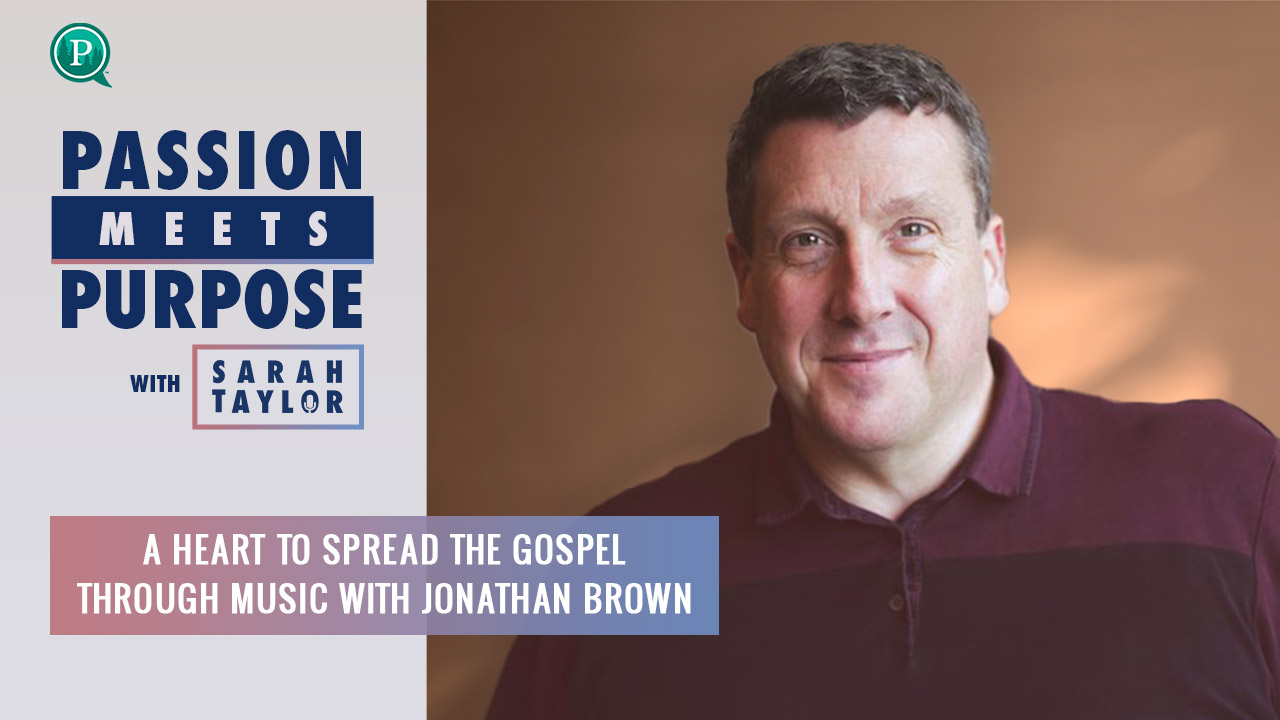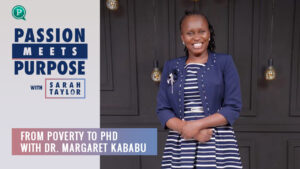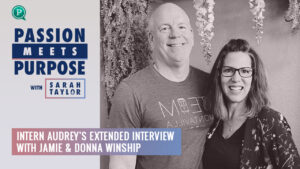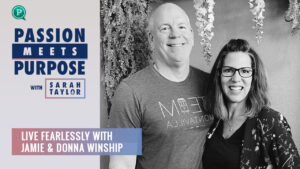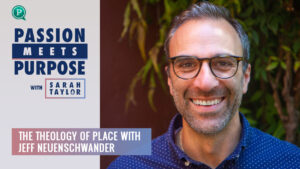Jonathan Brown is the President of Integrity Music Group and we welcome him to the Passion Meets Purpose Podcast today. A 27-year music industry veteran, Jonathan (better known as JB) joined Integrity Music in 2012. He is passionate about bringing music to the world so people can experience God through it.
Find out how God opened the right doors to lead him to a career that helps him do just that.
Interview Links:
Find Integrity Music: Online | Instagram | Facebook | Twitter
Transcription:
Purposely. Your life, God’s purpose. Listen at onpurposely.com
Jonathan Brown:
I was drawn to music, and obviously, what it personally did to me. And so, like kids today are gamers, so they want to work in computers. I think there was something of that in there, but God opened doors and brought people into my life that I will forever be grateful for, that enabled me to walk into that space.
Sarah Taylor:
Welcome to the Passion Meets Purpose podcast. My name is Sarah Taylor. This is where we discuss the things that you’re naturally good at, your gifts, your talents, your abilities, and then how do you put those on display for the rest of the world. Let’s jump in with today’s guest. Welcome Jonathan Brown. He’s the president of Integrity Music. And Jonathan, I am so excited to talk with you today on the Passion Meets Purpose podcast. Welcome.
Jonathan Brown:
Well, thank you. It’s nice to be here.
Sarah Taylor:
As I was sharing with you, this podcast is really just about the unique gifts and talents that God has given each of us, and I find quite often that there’s actually a glimmer of some of those gifts and talents when you’re a small kid. So I want you to think back to little Jonathan and maybe what your mom or dad would say about you. And how do you see just an ember of something that is now what you’re living out today? How do you trace it back to when you were little?
Jonathan Brown:
Yeah. I was brought up in a Christian home in England, in Nottinghamshire, so that’s where Robin Hood comes from. And both my parents, obviously, were Christians, Christian home. So whenever a touring artist would come to our home, to our church, they would always be the host home. I always remember our home being full of ministers, particularly people that were musicians, and there was a quite well-known Christian artist that came from our town called Phil and John.
And so, I just found myself amongst that, and I remember at a young age someone asking me what I want to do when I grow old type question and I remember saying, “I want to work for Word Records,” which at that time was the big Christian label from America. That was just, obviously, something hidden within my heart, because of my surroundings. Yeah. And then, later on in life, my parents moved from the center of England to the south, and I ended up, at the age of 16, joining the team at Word Records. And so, it’s providential, I suppose.
Sarah Taylor:
Wow. Okay. I was not expecting that answer. I mean, usually I get something like someone liked math, and then they ended up working in accounting. But you, as a child, knew that you wanted to work for a record label that involves worship music, and here you are.
Jonathan Brown:
Yeah. I don’t know how providential that was, but it definitely was a deep desire. I was drawn to music, and obviously what it personally did to me. And so, like kids today are gamers, so they want to work in computers. I think there was something of that in there, but God opened doors and brought people into my life that I will forever be grateful for, that enabled me to walk into that space. Yeah.
Sarah Taylor:
Let’s talk a little bit more about what music does to you on the inside. When was a first memory as a child where you were moved by a song or an artist to understand the love of God better?
Jonathan Brown:
When I was younger, my church put on a production called the Psalty the Singing Songbook. For those that are old like me, it’s songs like If I Were a Butterfly is one of the big songs. And so, I always remembered putting that production on and singing some of the lead songs. My Uncle Dave was Psalty in the production and we put it on for a whole week. The whole community came to see this production. And even now, if I’m driving a car and someone will sing one of those songs, it will just trigger and I’ll know every word and that’s probably 45 years ago, maybe even longer. So I find music fascinating, both in terms of how we retain information, but ultimately how it emotes us as people. Yeah.
Sarah Taylor:
Yeah. I’ve heard what’s remembered in song is remembered long. And so, I totally can relate to how when we find God’s word tucked inside of music, it hits that truth receptor inside of your soul.
Jonathan Brown:
I like that. I like the remembered long. I’ve never heard that before, so I’m writing that down.
Sarah Taylor:
Okay, well, I did not come up with that. That’s not an original. Some kids hear music and they think, “I want to be a musician,” but you knew that you also wanted to be behind the scenes. Tell me more.
Jonathan Brown:
Yeah. I think because of the way I’m wired and driven, I tried to learn a number of instruments when I was younger, but found that I didn’t have the patience and the aptitude for it, but I was fascinated by the way that music find a wide audience. That was something that naturally came to me. So I had a natural love for music. I had a natural love, as I found, for creative people, people that create music. But one of the things I personally enjoyed was finding ways to bring it to the widest possible audience. That was just something that I enjoyed thinking about, considering, and even, in my early years, just doing.
Sarah Taylor:
So for someone that’s listening and they want to do what you do, what would you say? If you have a heart to help bring music to the masses, how did you go about that? It’s not like you just landed at Word Records?
Jonathan Brown:
People ask me this question, and there was so much providence involved. My parents moved from the middle of England to the south. I just so happened to make friends with a person that was already in Word Records, and he just took me under his wing. I think there’s always those natural threads in our lives as people that took interest in us, and out of it you find common interest, common purpose, and it opens another door. And so, I’m a big believer that when you want to enter into a space, find like-minded people, that’s the first thing. Find a community, a tribe, whatever you want to call it, but don’t try and do it in isolation. Together, we’re better. And so, I would say find like-minded people who have a common interest, and then just start to learn. Just be inquisitive, be curious about it. And somewhere along the line, the door will open, a door that will give you an opening, and that’s exactly what happened to me.
Sarah Taylor:
How did you get from the UK to the US?
Jonathan Brown:
My checkered past is that I was at Word Records, which is a subsidiary of a US based company, based here in Nashville, for a number of years. And then, there was an explosion of worship music that came out in the late ’80s and ’90s, and one of the adoptions of that was a band called Delirious? and I joined that band as one of their… running their record label, and that opened doors and friendships across the whole of this city, Nashville, which is where I live now. From there, when Delirious? decided to retire, I joined a British company called Kingsway, it was another big worship entity in the UK of artists like Matt Redman and Tim Hughes, the Gettys, Brenton Brown, but real big songwriters, songs that the church sings all over the world. I was part of that. Rend Collective was another band.
And then, the parent company bought another company called Integrity Music. I was running Kingsway and what became Integrity Europe. And then, about six years ago, they asked me if I’d move and take over the leadership of the company globally, so that’s how I find myself here.
Sarah Taylor:
And you moved your whole family. How did that go?
Jonathan Brown:
I did. Well, it happened because, to be blunt, God ambushed us. I don’t think it was something we were looking for, it wasn’t something we asked for, it just felt a natural progression in what God was saying to us in our lives. So, in some ways, that has always been our stability of transitioning our family from one country to the next. One thing I do say now is, if you’re thinking of moving from one country the next, it’s much nicer to go and visit somewhere than it is to live somewhere. You only see the highs when you visit. You don’t see the reality of living somewhere until you actually get there. And so, it’s just become a precaution or even a help in people leading up to that level of transition. We did it pretty fast, because God opened doors in ways that we could never have done ourselves.
And in some ways, there was a lot of prophecy and words over our lives in that season. We probably received more prophetic words in that six month period than we have in our lifetime from people. People would walk up to be in a [inaudible 00:09:42] and say a prophetic word over my life. We would finish a meal and someone would say, “I’ve had this on my heart the whole time,” and it would directly speak into this transition that nobody knew about, but we were just processing at the time, as a family. And so, God has always been super, not just good to us, but kind to us in the detail. And so, the transition went pretty well. Culturally, that was a shift for my family, even though we speak the same languages. But I think we’re in a season, probably after about three to four years, we started to realize this was our home now, rather than a place that we’re adventuring into. Yeah.
Sarah Taylor:
In addition to those prophetic words, what was another way that God opened a door quickly where you just felt like you were standing back and watching?
Jonathan Brown:
We started to entertain the idea of whether we could move or not and one of the leptin tests was my wife was, “Do you think we’ll get a work visa to go and live in America for that season?” And part of it was because our oldest son wasn’t sure whether he could even get entry to the US. You’re bringing up emotions right now. And we got the authorization to move to America within a week. And so, if you know anything about immigration, that’s unheard of. We just had moments like that all the way through, that just took our breath away. Again, back to God’s kindness and just leading us. So to actually get the immigration visa within one week was outstanding and took our breath away.
When we moved here, we were looking for a house to live in and my son said, “I found a house online. We should go and look at it.” We’d been looking everywhere. And we drove up to this house and my wife said, “Do you think they’ll sell this go us?” And I said, “I don’t know if we can even rent it.” We met the couple that owned it, and we saw a Matt Redman CD in the closest in their little [inaudible 00:11:56]. And I thought, “Oh, that’s fascinating,” and got talking to them and just God opened a door for what became our first house we rented, and also the place we live, and it’s become a real sanctuary for us in creating conversation around table over the last five years. So we’ve just seen the evidence of God in the small and the way that he’s looked after our children has been extraordinary.
Sarah Taylor:
I love hearing stories of how God writes our story, how we goes before us, while also being beside it. And it’s funny, our family, we are contemplating moving right now, not across the pond and not even… literally, just neighborhood to neighborhood, and I’ve been praying about it, and my husband says to me, he doesn’t like to be in limbo, he wants to know we’re moving or we’re not moving, and I said to him, “Well, I’m waiting.” He goes, “You’re waiting for a sign from the Lord, aren’t you?” And I go, “Yes. Is there any other way to make such a big decision?” And he just laughs at me, but it’s so true, especially with big decisions, because God can see what we can’t. He knows what’s around the bend, and he knows the timing of where he wants us to be and when. And so, I don’t know any other way to make those decisions other than the discernment that the Holy Spirit brings.
Jonathan Brown:
I agree. And sometimes, like when we bought that house, when we went from renting to buying, my wife said, “The kids would like to live here.” So I said, “Well, I’ll ring the owner and see if they’re willing to sell.” And we rang them and I said, “Would you consider selling this?” And they said, “Oh, yeah. We would. We’ve already talked about it. We’d sell to you.” And I said, “Well, that’s lovely. How much do you want?” And they gave me a number, and we’d just sold our house in England and I was running the numbers in this little office I had, and my wife walked in and she said, “Can we afford it?” And I said, “I don’t think we can. I think it’s going to be too much of a stretch.” Oh, she said, “How much can we afford?,” and I wrote it on the pad, and the phone went and the guy rang me back again and said, “We’ve just been talking about it. We’d take this price instead.” I didn’t even say we couldn’t afford it. They just said, “We reversed the price,” and it was the exact price on the pad.
Sarah Taylor:
Oh, this is so good. This is what I love to hear. I want you to tell me more stories like this that you’re seeing, because I know that partly for your job, you travel across the world, Integrity is a global label, and for someone listening right now and they would love to see what is going on in the global church and new ways that God is moving, they just don’t have the availability to hop on an airplane and see it firsthand, would you share, recently, some of your travels and what you’ve seen?
Jonathan Brown:
Well, the privilege of my life is to travel around the world and hang out with my friends, and sometimes that’s what I call my job. God has just opened up so many wonderful people. And so, we work with artists both in the US and the UK, but we also work with artists all over Europe, Latin America. We’ve started to work more and more with artists in Africa, one of our biggest songs in the last few years has been the song Way Maker written by a lady called Sinach out of Nigeria, Lagos. And so, we just have all these friendships and when we enter a part of the world we call it the friendship and learning tour. I’m a big believer that we’ve got so much to learn from around the world, and what God is uniquely doing. And then, finding ways, if he so wishes it, to partner with that, rather than go in and say, “This is who we are. Can I use your resources to build something?” I think when we come alongside people and partner, that’s the way that God originates. God blesses things in unity.
And so, about six weeks ago, we decided we were going to go to Southeast Asia. I’ve been a number of times there, but not since COVID. Prior to actually leaving on the Thursday, a friend of mine rang over the weekend, beforehand and said, “JB, there’s something happening in the university called Asbury. You should come up.” And so, on the Monday morning in Asbury University in Kentucky, me and a couple of my friends here went to Asbury and spent the day, just sat in this sanctuary where these young people, as you probably know, and starting leading worship and recommitting their lives to Christ. On the Wednesday, this is now the Monday, and they obviously continued way beyond that, but we went in at that point, and just felt this real sense of humility in the room, a real sense of repentance and an adjustment of our lives to holiness. And it just deeply moved me, just the sincerity. It wasn’t about production, it wasn’t about proficiency, it was just about his presence.
And again, for someone who works with creatives and music, that’s always a great reminder. If I had time, I’d tell you the back story to the song Heart of Worship, because he talks about that emoting. So I moved from there and got on a plane to Seoul, Korea. It’s the first time I’ve been there, from all these students to this gathering of probably 200 young adults, again, in Seoul, Korea, most of them being worship leaders and song writers, and the same thing happened. We were in the back of a room, and as we worshiped just God poured out in these young people, these young voices, and there’s just a real sense of humility and adjustment to his holiness, and I just found myself weeping at the back of the hall again, in the same way I was at Asbury.
What was profound about Seoul was when they were worshiping, it was beautiful, but when they prayed, I’ve never seen people pray like that. They have a culture of pray in Korea, South Korea, because in the ’80s 40% of the nation came to Christ through pray, and it’s been passed on from generation, so when they prayed in the middle of this time together, I mean, the room shook, because they were so fervently looking for God to come and be amongst them. That was a real interesting moment for me, understanding the premise of pray and praise, rather than just praise and worship, which is one of the things we talk about. So we went from Seoul to Singapore. A lot of the time, we went in, we were just asking just to meet worship leaders and songwriters within coffee shops, but through the graciousness of homes, we were gathering, again, another 200 people, 150 people in Singapore.
But they went from 53 churches, in that city, in that country, and again the same thing happened. We just worshiped, God just started to move amongst us, and I’ve seen that community gather again since we left. Again, the same thing, young people down at the front on their knees, in repentance and seeking the fellowship of God in holiness. And so, I went from there, we then traveled to Indonesia, and it was in Indonesia we realized everywhere we went, there was large gatherings of young people, but they were coming from all over the city. It was very diverse. And what was more exciting, I realize as we look back on the last two gatherings in Seoul and Singapore, that what the excitement wasn’t about us being there, it was actually the fact that we were in the room with all these people from across their city they had not seen for such a long time, and that were worshiping together.
There was a real sense of unity, and of excitement at the diversity in the room, the different traditions, the different generations, and some of the older guys were there. We realized really quickly that the best thing we could do is get out of the way, and bring up their leaders for Q&A, break them into small groups and that’s when real beauty started to happen. And the same thing again, God started to move, and we were on our knees again. And so, we found out both in Indonesia and in Surabaya. I came back to the US, sorry it’s a long story, but you did ask, and about a week later I went to Europe, spent some time in the UK, again, started hearing stories about how God is pouring out on young people. A friend of mine goes does missionary work in schools across the UK. After they do a mission, they get about 30 to 50 young people come and do their discipleship course afterwards. He said, “JB, I don’t know what’s happening, but we’re getting 300 kids on the first week, and we’re getting 400 kids in the next week coming to these. They’re so hungry for God.”
And then, I finally went to Holland, to a place called Veenendaal, which is in the middle of Holland. Again, this lady got up to communicate, it’s about 2,000 people in the Sunday morning meeting and she just stood up and she said, “I was about to preach and the Holy Spirit prompted me, three minutes ago, to change direction. So I’m just going to be obedient.” And she said, “So would the young people in the room stand up, all those young people under 25.” And she called out [inaudible 00:21:54] this generation. And then, she asked for their mom and dads to stand up and pray over them. What was supposed to be an hour and half meeting ended up almost three hours, as the kids were at the front on their knees and the mom and dads are at the back just weeping, as God just ministered.
So it’s been a beautiful season of not just seeing an outpouring in one location, but wherever I go that same hunger and desire for his presence, particularly in that generation, probably 30 and under right now, was just beautiful. I’m now old. It was just beautiful to witness that from the back and the halls, and the gathering and just seeing God move. And I just think there’s a deep, deep desire for the love of Christ in this moment that brings us to repentance. And so, I mean, that’s been the beauty. And then, obviously, because of my role, I’m hearing similar stories from different places all over the world.
Sarah Taylor:
That’s so good to hear, because as a mother myself, you see the news feed on your phone, right? And you think, what kind of a world am I raising my kids to step into? And to hear everything that you just said, God has his eye on this next generation, and instead of being afraid, we can be excited.
Jonathan Brown:
A friend of mine did some research around where Asbury is, Kentucky and Tennessee, and he found out that in the last 12 months, in Tennessee and Kentucky alone, 6,000 young people have taken their lives to overdose, in that period. And the single biggest reason is they’re trying to escape, escape identity, depression, loneliness. And I think when God moves into these spaces amongst these young people, and they find that they resonate with the love of his, they give everything. It’s almost a reaction to the fact that this not enough, but you are, and I think that’s what we’re witnessing right now.
Sarah Taylor:
I think I already know the answer to this, but I’m going to ask you and probably be correct, I want to know what success for Integrity Music looks like, because for the person listening to this podcast, I would say that the majority of other record labels that are outside of a faith component, right? Their job is to make a profit and have a solid business model. And I am curious what your idea of success and what the mission of Integrity Music is?
Jonathan Brown:
For me, success is based on whether we feed the church rather than feed from it. So a key conversation in our building is, how do we make sure that what we do is useful for the church, in the moment that we find ourselves, in terms of new songs, their outpouring, what God is doing in the church and for the church. So our vision statement is to be the trusted partner of the local church globally. And the thing that we build equity around is trust. Not big, not dollars, we believe that trust is really important, because that enables us to be useful.
So it’s to be the trusted partner of the local church globally, where everyone has a part of play in revealing the kingdom of God together. At the core of who we are, we believe in a construct called the priest of all believers, that we’re all priests and we all get to bring our very best to the Lord and to each other. That’s the premise of the priesthood. In fact, the most commonly used phrase in our building is, “Everyone has a part to play.” And so, we do that, in order to reveal the kingdom of God together.
Sarah Taylor:
How do you know if that mission is being accomplished?
Jonathan Brown:
Because we keep being invited into the conversation rather than shooed away.
Sarah Taylor:
You get invited back.
Jonathan Brown:
Yeah. That’s what you do with people you trust. And there are times we’re clumsy, because we’re humans. And so, being able to say we’re sorry is also a great quality for all of us.
Sarah Taylor:
Thanks so much for being here today on the Passion Meets Purpose podcast. We’re going to talk again in two weeks, but in the meantime, if you want to do us a huge favor, obviously, you know this by now, if you leave a review, it really helps others to find this podcast, it also helps us to make it better, and then you can contact us anytime at purposelypodcasts. Until next time, thank you.
Follow this podcast:

